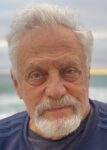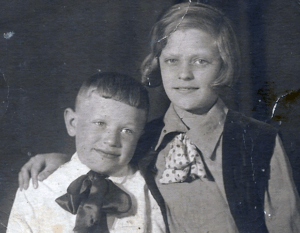“Once more the hour of remembrance draws near
And it’s almost as though I can see them all here”:
—Anna Akhmatova, Requiem
By Yakov Nayerman

SAN DIEGO — Soon there will be the Yom HaShoah, Holocaust Remembrance Day, (in 2025 it is on April 23). And every time I think about the Holocaust, I remember a story my mother once told me.
I was about twelve years old. It was around nine in the evening. My father was away on a business trip. My mother and I were sitting in the kitchen—our favorite and warmest place in the apartment. In front of her was a stack of notebooks she had to check. I was reading something about the war.
I knew that my mother had been around 14 when the war began and that she had spent most of it in evacuation in Yangiyul, not far from Tashkent.
— Mom, did you ever see a living German during the war?
— Yes, twice. The second time was after the victory, when they marched the prisoners through Moscow.
— And did you ever see a shooting?
— Yes, I did. From a distance.
— When?
— When I saw the Germans for the first time.
— How did it happen?
— It’s hard for me to remember. Let’s not, okay?
— But, Mom, if you don’t tell me now, I’ll never know. Is it a secret?
— No, not a secret. I’ll tell you someday. But for now, go to bed…
— But why not now? No one is interrupting us. When will we get a moment like this again?
My mother fell silent. She sighed. Then, lowering her voice to a near whisper, she began:
— They say it’s not a good idea to tell frightening stories before bed, but all right, I’ll try…
As you know, we moved from Kryzhopil (Vinnytsia region in Ukraine) to Moscow in 1938. There were seven of us living in a basement-level room, just 14 square meters in size. At night, we would take apart the dining table, and that’s where I slept. Uncle Volodya slept under the table. I eagerly awaited summer, when we would go back to Kryzhopil for the summer break. My aunt Esther had a little house there, chickens, the sweetest watermelons, and all my best friends.

We went there in 1941 as well. I was 14, and I had my little brother, your uncle Syuta with me. Three weeks later, the war began.
They gathered us in the square near the town council. After official announcement on the radio, the chairman of the council came out and said that all Jews needed to flee while there was still time.
Many, especially those who had seen Germans during the First World War, said that the Germans weren’t so bad, that nothing could be worse than the Bolsheviks, and decided to stay put. (“The communists are lying on purpose.”) But my uncle Avreimul, who had recently seen Jewish refugees from Poland, knew that this was not just propaganda. He ran to every relative and friend, urging them: “Run immediately!”
The railway was bombed on the first day of the war, all the vehicles had been requisitioned for the army, and the collective farm provided 19 old horses with carts for over 100 people—mostly elderly, children, and disabled individuals. The others had already been drafted.
Our horse was named Orlik. There were eight of us in our cart: my uncle and aunt, their three sons, an old grandmother, and the two of us. But everyone except for Grandmother walked alongside, to ease the burden on Orlik.
We had to hurry, as the front was catching up with us…
It was terrifying. When the bombings started, we would pull off the road and hide in the ditches. The German Messerschmitts flew low, with a terrifying wailing sound that no hiding place could block out.
Once, a bomb fell right near us, on the road. Dirt rained down on us, and the explosion left me almost deaf for several days.
But the worst part was crossing the rivers over the bridges.
Refugees were only allowed through during “pauses,” when no military or government vehicles were passing. A few carts at a time. The rest had to wait at the side of the road.
We knew that once the front got too close, the bridges would be blown up—to keep them out of enemy hands.
So we had to make it across in time.
And so, one day, we were crossing a small river. It had a funny name—Sinyukha, I think. Our cart and 15 others had already made it across, but four were still on the far side. Among them was my best friend, Malka.
We stood waiting at the side of the road, opposite them, about 50 meters away, waving to each other across the river.
And then, suddenly, the Germans appeared.
First, they dropped a few bombs—all on the far side, near the approach to the bridge. And then, out of nowhere, parachutists began to appear.
As I now understand, they were sent to secure the bridge.
We had never seen paratroopers before. They looked like tiny sails, flaring up behind the planes and rapidly descending to the ground on the other shore.
We watched, mesmerized, unable to look away.
I remember being struck by how quickly and precisely they gathered up their enormous parachutes and deployed their equipment. It took them just a few minutes.
For some reason, no one even tried to stop or attack them.
The ten carts on “our” side of the river quickly rolled away.
Three families, whose relatives were still on the other shore, and we—remained behind. I refused to leave without Malka.
The few trucks that had been near the bridge hurriedly crossed over to our side.
Our people from Kryzhopil also tried to rush toward the bridge—but they were too late.
A few Germans, not even bothering to gather their parachutes, sprinted toward the bridge, drove everyone away, and began checking for mines.
Then, one of them—probably an officer—walked up to the group of our refugees huddled together. He shouted something and pointed toward the river.
They all started moving in that direction.
I saw Malka’s father, Uncle Yosya, trying to say something—probably asking for permission to cross the bridge.
The officer struck him.
Yosya got up and hurried after the others.
Two more soldiers joined the officer.
They herded our people to the edge of a fresh bomb crater.
And then, suddenly, they started shooting.
There were a few terrible screams—
And then silence.
I stood there, frozen, as if paralyzed.
After that, I remember nothing.
I don’t remember who carried me to the cart, I don’t remember how we caught up with the others.
I vaguely heard the wailing and sobbing of the women whose loved ones had been executed.
We traveled all night.
Our men walked beside us, chanting prayers in a low, mournful voice.
There were still several agonizing weeks of fleeing, racing against the front line. Hunger—we survived on nothing but grain husks. A month in a cattle wagon. Typhus. Burials along the way.
Much of it has faded, blurred in my memory.
But those few minutes of execution—I remember them as if they happened this morning.
Perhaps they will be the last thing I remember before I die.
It was very difficult for me to tell you this.
But I want you to know.
And someday, I want you to tell your children.
Because, according to our faith, when we remember the dead, we extend their existence there.
Promise?
— Yes, Mama.
*
Yakov Nayerman in his retirement is a freelance writer based in San Diego.